译林版小学六年级英语
译林版小学六年级英语下册--课文翻译

Unit 1 The lion and the mouseStory time故事时间翻译①There was a lion in the forest. He was very large and strong.森林里有一只狮子。
他非常大并且强壮。
②One day, a mouse walked by and woke the lion up. The lion was angry and wanted to eat the mouse. "Please don't eat me. I can help you some day, "said the mouse quietly. "You're so small and weak! How can you help me? "laughed the lion loudly. Then, he let the mouse go.一天,一只老鼠走过,把狮子吵醒了。
狮子很生气,想要吃了这只老鼠。
“请不要吃我。
有一天我能帮助你。
”老鼠小声地说。
“你这么弱小!你怎么能帮助我?”狮子大声地笑。
然后,他放开了老鼠。
③The next day, two men caught the lion with a large net. The lion bit the net with his sharp teeth, but that did not help. "How can I get out? "asked the lion sadly.第二天,两个男人用一张大网抓住了狮子。
狮子用他锋利的牙齿咬那张网,但那不管用。
“我怎么能出去呢?”狮子难过地问。
④Just then, the mouse saw the lion. "I can help you, " he said. Soon, the mouse made a big hole in the net with his teeth.The lion got out. "Thank you!" said the lion happily.就在那时,老鼠看见了狮子。
六年级上册英语第四单元译林版

第一部分:课文概述1. 课文主题:本单元的主题是描述家庭活动和家庭成员2. 课文内容:课文主要介绍了一位名叫Tom的男孩,他的家庭成员以及他们每天的家庭活动。
Tom有一个弟弟,他们一家四口每天都会一起吃早饭,然后各自去上学或上班。
3. 课文结构:课文结构清晰,通过对Tom家庭成员和每天的家庭活动的描述,使学生能够更好地了解家庭生活并学习相关词汇和句型。
第二部分:课文重点词汇与句型1. 重点词汇- family 家庭- brother 弟弟- breakfast 早餐- have+名词/动词原形拥有/进行某事- go to school 去学校- work 工作2. 重点句型- There are four people in my family. 我家有四口人。
- We have breakfast at 7:00. 我们七点吃早餐。
- My brother and I go to school at 8:00. 我弟弟和我八点去学校。
第三部分:词汇拓展和语法点总结1. 词汇拓展- sister 姐姐- mother 母亲- father 父亲- eat breakfast 吃早餐- go to work 去工作2. 语法点总结- 学生需要掌握家庭成员的称呼和家庭活动的相关词汇,例如family, brother, sister, mother, father, breakfast, go to school等。
- 学生需要理解have+名词/动词原形的用法,以及go to +地点的用法。
第四部分:教学建议1. 教学目标- 通过本单元的学习,学生应能够描述自己的家庭成员和家庭活动。
- 学生应能够掌握相关的词汇和句型,能够运用所学知识进行简单的口头交流和书面表达。
2. 教学方法- 通过图片、漫画、视频等多媒体形式呈现相关场景,激发学生的学习兴趣。
- 采用任务型教学法,设计一些与家庭活动相关的任务,让学生在实践中学习和运用所学知识。
译林江苏版小学英语六年级上册知识点汇总

Unit 1 The king's new clothes一,单词 / 词组1. long long ago 很久以前2. new clothes 新衣服3. make new clothes for you 为你制作新衣服 make sth for sb4. show the king his new clothes 给皇帝展示新衣服show sb. sth.= show sth. to sb 、show me〔宾格〕your book5. try on 试穿 try on the coat=try the coat ontry it/them on try 宾格 on6. magic clothes 有魔力的衣服7. walk through 步行穿过8. in his new clothes 穿着他的新衣服9. shout at sb 对某人大叫10. laugh at sb 对某人大笑11. look at 看12. point at 指向13. fit well 非常适合14. an American cowboy 一个美国牛仔15. a Scottish man 一位苏格兰人16. tell a story 讲一个故事17. say a/one sentence 说一句话18. on the mountain 在山上19. the next sentence 下一句话 20. live in the house 住在房子里21. tell the boy a story 给这个男孩讲一个故事tell sb sth22.it is one's turn 轮到某人做某时 It's my trun. 轮到我了.23.think hard 努力思考24.have to 不得不have to do sth 〔must do 必须做…〕、〔can do 能做…〕当我们想说某件事必须或必须要做时,我们使用“Must”和“Have to”两个词.“Must”定义了做某件事的紧迫性,“Have to”表示其他人强加的义务.25. in front of 在前面〔外部〕 in the front of 在前面〔内部〕26. walk by 路过27. be nice to sb 对某人好28.look after 照顾29. turn into 变成29.next下一个, each 每个30.watch a film 看电影 in the cinema 在电影院st year 去年, last week 上周, yesterday 昨天二,句型1. Long long ago, there was a king. 很久很久以前,有一位国王〔皇帝〕.2.The king was happy. 国王很开心.3. He liked new clothes. 他喜欢新衣服.4.Two men visited the king. 两个男人拜访了这位国王.5.One day,two men visited this king. 一天,两个男人拜访了国王.6.The two men showed the king his new clothes. 那两个男人给皇帝展示〔看〕了他的新衣服.一般过去时:指已经发生过的动作或事件,至今为止这个动作或事件已经停止.过去式, is → was , are → were , hava → had, do → did主语 + 行为〔过去式〕+ 其他I was born in 2009. 我在2009年出生.He didn't do his homework yesterday. 他昨天没有做他的家庭作业.I didn't know you were here. 我不知道你在这里.过去时的一般疑问句Did + 主语 + 行为动词〔原型〕 + 其他 + ?回答 Yes,主语 + did, No,主语 + didn't动词的过去变形规则:1. +ed〔一般动词的过去式直接在动词后面加上 ed 即可)2. +d〔以 e 结尾动词,过去式直接加上 d 即可)3. 去 y + ied〔以 y 结尾, 并且 y 旁边没有元音字母的动词,把y变成 i, 再加上 ed)4. 动词的不规则变形〔以下为常用动词的不规则变形,要牢记这些动词哦!〕Unit 2 What a day!一,单词/词组What a day! 糟糕的一天;忙碌的一天;累人的一天等等〔表达的含义很多,根据具体语境来看〕这里指"糟糕的一天"1. the 19th of September 在九月十九号2. a sunny/ windy / rainy day 晴朗的/ 刮风/下雨的一天3. a lot of rain 许多雨〔不可数〕4. a lot of snow 许多雪〔不可数〕5. see/ watch a parrot show 观看一场鹦鹉表演6. see some interesting parrots 看见一些有趣的鹦鹉7. an interesting film 一部精彩的电影8. become windy and cloudy 变成大风和阴天〔多云〕9. fly kites high in the sky 风筝放得高10. bring some dumplings 带来一些饺子11. bring lunch 带午餐12. some bread and honey 一些面包和蜂蜜13. some drinks 一些饮料14.hungry and thirsty 又饿又渴15. wet clothes 潮湿的衣服16. have/ eat our lunch 吃我们的午饭17. black clouds 乌云18. meet me/ him/ her/ them/ you 遇见我/他/ 她/ 他们/ 你19. look sad/ happy 看起来很伤心/ 开心20. this morning/ afternoon/ evening 今天早晨/ 下午/ 晚上21. climb up the hill 爬上山22. get up at seven 七点起床23. go to school by bike 骑自行车去上学24. have a picnic 野餐25.watch a film 看电影26. in the sky 在空中27. all day 一整天28. go away 走了29. lose my kite 丢了我的风筝30. want to know why 想要知道为什么31. what happened 出了什么事32.fly too high 飞得太高33. find it 找到它34. near the hill 在小山附近35.in your diary 在你的日记里词组短语1. hold onto it 抓紧它2. fly away 飞走了3. find it near the hill 在山的附近找到它4. in your diary 在你的日记里5.cheer together 一起欢呼6.go to the park by bike 骑自行车去公园7.in the sky 在空中8.Well Done! 做的好!9.near the hill 在小山附近二、句型:1、今天的天气怎么样?是晴朗的.A:How's the weather today? B: It's sunny. The weather is sunny. 2、昨天的天气怎么样?是下雨的.A; What was the weather like yesterday?B : It was rainy. The weather was rainy.3、我看见一些有趣的鹦鹉.We saw some interesting parrots.4、我们上周日放风筝了. We flew kites last Sunday.5、昨天他带来了一些饮料,面包和蜂蜜.He brought some drinks, bread and honey yesterday.6、两天前她带来了一些水饺. She brought some dumplings two days ago.7、昨天下雨了. It rained yesterday.8、Why do you have it?你怎么会拿到它的?三、语法1、过去时态:本课出现的动词不规则变化(同学们要反复朗读)give- gavecome- camesee- sawwrite- wrotemeet- metfly- flewlose- lostbring- broughtcan- couldbecome- becamebuy- broughtfind- found2、rainy - 下雨的〔形容词〕3、snowy- 下雪的〔形容词〕rain snow〔1〕名词:雨〔不可数〕 a lot of rain :〔1〕名词:雪〔不可数〕 a lot of snow 〔2〕动词:下雨〔2〕动词:下雪例句:a) It rained yesterday. 昨天下雨了.b) Look! It is raining now! 看!现在正在下雨.c) It often rains here. 这儿经常下雨.d) It's often rainy.经常下雨了.3. by bike 骑自行车和 ride a bike 骑自行车的区别:by bike 属于副词短语,指的是交通方式,比如说别人问,你一般上学用什么交通工具,你回答"I go to school by bike",而 ride a bike 属于动词短语,指的是动作,别人问你说,你在干吗?你说: I am riding a bike"(正在骑车)而不能说 I am by bike,因为 by bike 是指交通方式.Unit 3 Holiday fun一,单词、词组1. come back to school 返校2. the National Day holiday 国庆节假期3. call you 打电话给你4. visit my aunt 拜访我的婶婶5. Shanghai Museum 上海博物馆 visit Shanghai Museum 参观上海博物馆6. see many interesting things 看见很多有趣的东西7. go to a farm 去农场8. near Star Lake 在星湖附近9. pick some oranges 摘一些橙子10. go fishing 去钓鱼11. catch a big fish 抓到一条大鱼12. Tian'anmen Square 天安门广场13. Palace Museum 故宫博物院14. Summer Palace 颐和园15. the Great Wall 长城16. pick an orange for me 为我摘一个橙子 17. main school holidays 学校主要的假期18. the Easter holiday 复活节假期19. the summer holiday 暑假20. the Christmas holiday 圣诞节假期21. come home late 晚回家22. have a fashion show 有一场时装秀 23. love beautiful clothes 爱漂亮的衣服24. be excited about the show 对秀感到激动25 wear paper clothes 穿纸衣服26. wear a lot of bottles 穿很多瓶子27. ask about the show 询问关于秀的事28. go well 进展顺利29. at first 在开始的时候30. heavy rain 大雨31. the Car Museum 轿车博物馆 32. visit his cousin 拜访他的表兄33. have a birthday party 举行一个生日聚会34. catch a fish for me 为我抓一条鱼二,动词过去式catch---caught eat---ate get---got meet---metlose---lost hold---held find---found三.重点句型:1. What did you do for the holiday?2. How was your holiday? It was great fun.3. Why did you call me?Because I wanted to give the fish to you.4. What great fun!5. It is time for dinner.拓展:1. excited / exciting I'm excited at the exciting running race.Unit 4 then and now一,单词、词组1. then and now 过去和现在2. six years ago 六年前3. do many things 做很多事4. write letters to his friends = write to his friends 写信给他的朋友5. in the office 在办公室里6. use the telephone 使用电话7. call people 打电话给人们8. a mobile phone 一部手机9. call people anywhere 随处打电话给人们10. write/send an email 写/发一封电子邮件11. listen to the radio 听收音机12. watch news on the Internet 在网上看新闻13. read e-books 看电子书14. make friends with sb. 与某人交朋友15. e-friends from all over the world 来自世界各地的网友16. do shopping = do the shopping = do some shopping = go shopping 购物17. work hard 努力工作18. invent the aeroplane 发明飞机19. an American man 一位美国男士20. a British girl 一个英国女孩21. have an English lesson 上一节英语课22. look out of the window 朝窗外看23. listen to me 听我说24. go on 继续25. spell the new words 拼写新单词26. get angry = be angry 生气的27. make a sentence with 用来造句28. wait for the answer 等待答案29. a photo of yourself 一张你自己的照片30. just now 刚才31. a moment ago 一会儿以前32. read newspapers for news 看报纸上的新闻33. buy things from shops 从商店买东西34. use to 用做35.read and draw 读和画36.do shopping on the Internet 在网上购物37.surf the Internet 网上冲浪38.buy me a mobile phone/buy a mobile for me 给我买手机e the phone to call you 用电话打给你38.like making friends 喜欢交朋友.二,句型1.What day is today? = What day is it today?=What's the day today?今天星期几?2.Six years ago, Mike could read and draw, but he could not write. Now he can do many things.六年前麦克会阅读和画画,但是他不会写.现在他会做许多事情.3.He wrote letters a week ago.一周前他写了信.4.They listened to the radio for news ,yesterday. 昨天他们听录音机里的新闻.5.The man can call people anywhere.这个男人可以在任何地方打电话给人们.6.My brother could not draw before. 我的弟弟以前不会画画.7.My sister is writing a letter to her friend. 我的妹妹正在给她的朋友写信.三,练习1.Amercian 美国的〔名词〕:America2.British〔大不列颠及北爱尔兰) 联合王国的〔名词〕3.angry〔副词〕:angrily4.can〔过去式) :could5.cannot / can't(过去式) :could not6.can / could + 动词原形8.before today = yesterday7.good〔副词) :well9.interest〔形容词〕:interesting10.Chinese(复数) :单复相同11.Japanese(复数)12.British〔复数)13.American(复数)14.French man〔复数)15.Australian〔复数)16.Australian〔名词〕一般过去式一般过去时:指已经发生过的动作或事件,至今为止这个动作或事件已经停止.标志词:yesterday, lastEg: I went to Eric's party last week.助动词: didEg: Did you go to school yesterday morning?Be 动词:was, wereEg: Was the dog here just now?动词的过去式变形1. +ed〔一般动词的过去式直接在动词后面加上 ed 即可)2. +d〔以 e 结尾动词,过去式直接加上 d 即可)3. 去 y + ied〔以 y 结尾, 并且 y 旁边没有元音字母的动词,把y变成 i, 再加上 ed)4. 动词的不规则变形〔以下为常用动词的不规则变形,要牢记这些动词哦!〕【巧】时间状语〔即标志词〕.一般过去时表示过去发生的动作或存在的状态,恰巧与表示过去的一些时间状语连用.1.yesterday或以其构成的短语:yesterday morning(afternoon, evening)等;2. 由 " last+ 一时间名词 "构成的短语last night, last year〔winter, month, week)等;3.由"时间段 + ago "构成的短语: a moment ago, a short time ago, an hour ago 等;4. 其它:just now 等5. 由某些表示过去时态的从句等〔1〕一般过去时的肯定陈述句:主语+动词过去式+宾语或表语.He worked in Shanghai ten years ago.〔2〕一般过去时的否定句:a.主语+ didn't +动词原形+宾语.〔did + not =didn't)He didn't do morning exercises yesterday.b.主语+wasn ' t/weren ' t +表语 .(was + not = wasn't were + not = weren't)He wasn't an English teacher ten years ago.〔3〕一般过去时的一般疑问句:a.Did +主语+动词原形+宾语?Did you study English in 1990 ?肯定回答用"Yes, 主语+did.; "否定回答用"No,主语+didn't.. "b.Was/Were + 主语+表语?Was he a pupil five years ago ?肯定回答用"Yes, 主语+was/were.; "否定回答用"No,主语+wasn't/weren't.. "〔4〕一般过去时的特殊疑问句:a.特殊疑问词+ did + 主语+动词原形+宾语?Where did your parents live five years ago?What did you do last Sunday?b.特殊疑问词+ were/was +表语?Who was at the zoo yesterday?Unit5 Signs一,词组1.at a shopping centre 在购物中心2.be careful 当心3.Wet floor. 小心地滑4.a juice shop 一家果汁店5.want some juice 想要一些饮料6.litter everywhere 到处乱丢垃圾7.take it into... 把它带进8.go in 进入9.eat noodles in a restaurant 在餐厅吃面条10.smell the flower 闻闻花香11.my mother's birthday 我妈妈的生日12.on an outing 户外远足13.time for lunch 该吃午饭了14.time to have lunch 该吃午饭了15.feel tired and hungry 感觉又累又饿16.look for him 寻找他17.bring some bananas 带一些香蕉18.sweet grapes 甜葡萄19.walk on 继续行走20.look around 四下张望21.design signs 设计标识22.public places 公共场所23.ask and answer 问答24.put in on the wall 把它放在墙上25.No swimming. 禁止游泳26.No climbing. 禁止攀爬27.No smoking. 禁止吸烟28.No eating or drinking. 禁止饮食二.句型1. A: What does it mean? 它是什么意思?B: It means the floor is wet. 它的意思是地面潮湿.2.It means you can't smoke here. 它的意思是你不能在这吸烟.3.It means you can't eat or drink here. 它的意思是你不能在这饮食.4. It means you can't litter here. 它的意思是你不能在这乱扔垃圾5. You can read books in the library. 你可以在图书馆看书.6. They see a lot of monkeys around them. 他们看见在他们周围有许多猴子.7. A: What do these signs mean? 这些标识是什么意思?B: They mean you can't swim here. 他们的意思是你不能在这游泳.Unit6 Keep our city clean一.词组1. these picture of our city 我们的城市的这些图2. Smoke from cars 汽车排出的烟3.make the air dirty 使空气变脏4. black smoke from factories 来自工厂的黑烟5. messy and dirty 又乱又脏6. in the water 在水里7.the fish are dead 鱼死了8. keep our city clean 保持我们的城市干净9. take the bus and the metro 乘公交车和地铁10. walk to school 步行去上学11.move some factories away from our city 把一些工厂移出我们的城市12.put rubbish in the bin 把垃圾放到垃圾箱里13. plant trees 植树14. after school 放学后15.clean and beautiful 又干净又漂亮16. throw a banana skin 扔香蕉皮17.on the ground 在地面上18. pick it up 把它捡起19.make the street messy 使街道变乱20.too late 太迟21.slip on the banana skin 在香蕉皮上滑倒22.go to hospital 去医院二.句型1. A: What makes dirty/messy? 使变脏乱?B: makes/make dirty/messy.2. A: What can we do to ? 我们怎样做能?B: We can. 我们能3. A: What makes the air dirty ?什么使空气变脏?B: Smoke makes the air dirty.烟使空气变脏.4. A: What makes the city messy?什么使城市变乱?B: Rubbish makes the city dirty.垃圾使城市变乱.5. A: What can we do to keep our city clean? 我们怎么做才能使我们的城市变干净?B: We can put the rubbish in the bin. 我们可以将垃圾放入垃圾桶里.Unit 7 Protect the Earth一.词组1、save water 节约用水2、drink water 喝水3、use water to clean things 用水清洗东西4、every day 每天5、in many places 在许多地方6、much water 许多水7、waste water 浪费水8、save energy 节能9、come from=be from 来自...10、on Earth 在地球上11、a lot of energy 许多能源12、save trees 拯救树木13、make tables 做桌子14、cut down 砍伐15、too many+可数名词16、too much+不可数名词17、be bad for 对...有害〔反〕 be good for 对...有益18、plastic bags 塑料袋19、glass bottles 玻璃瓶20、Earth Day 地球日21、do a project 做课题22、all students 所有的学生23、make a poster 做一张海报24、tell sb about sth 告诉某人某事25、tell sb to do sth 告诉某人做某事26、on the trees 在树上〔长在上面的〕27、in the tree 在树上〔不是长在上面的〕28、a rubbish bin 一个垃圾桶29、at the school gate 在学校门口30、protect the Earth 保护地球31、drive(过去式)drove32、our home 我们的家园二.句型1、We use water to clean things .我们用水清洗物品.2、We use plastic to make bags and bottles.我们用塑料制作包和瓶子.3、We use wood to make tables, chairs and other things. 我们用木头制作桌椅和其它东西.4、We should use paper bags and glass bottles. 我们应该使用纸袋和玻璃瓶.5、We should save trees.我们应该拯救树木.6、We should not drive so much.我们不应该驾驶太多.7、We should not use too many plastic bags or bottles.我们不应该使用太多的塑料袋或瓶子.8、We should not cut down too many trees. 我们不应付砍伐太多树木.9、We should not waste water.我们不应该浪费水.Unit8 Chinese New Year一.词组1.Chinese New Year 春节2.Hong Kong 香港3.next week 下一周4.in the evening 在晚上5.make some cakes 做些蛋糕6.Chinese New Year's Eve 除夕7.have dinner 吃晚饭8.Chinese New Year's Day 大年初一9.my parents 我的父母亲10.red packets 红包11.a lion dance 一场舞狮表演12.watch fireworks 看烟花13.the most important holiday 最重要的节14.Spring Festival 春节15.cook dumplings 煮饺子16.get sth from sb 从某人那得到〔收到〕某物17.after dinner 晚饭后18.talk about 谈论19.a nice cake 一个漂亮的蛋糕20.the second day of Chinese New Year 大年初二二.句型1. A: What are you going to do on Chinese New Year's Day? 大年初一你打算干些什么?B: I'm going to watch a lion dance. 我打算看一场舞狮表演.2. A: What are they going to do tomorrow evening? 明天他们晚上将要干什么?B: They're going to watch fireworks. 他们将要看烟花.3. A: What is he going to do on Chinese New Year's Eve ? 除夕他打算干些什么?B: He's going to have a big dinner with family. 他打算和家人吃一顿大餐.4. A: What is she going to do this afternoon ? 下午她打算干些什么?B: She's going to buy some new clothes and food .她打算买些衣服和食物.时态复习一、现在进行时现在进行时:表示正在进行的、发生的动作.通常在句子中有以下的词:now, look, listen. 句子的结构如下:be + doingam,is,are的用法口决:我用am,你用 are,is 跟着她,他,它,单数 is,复数 are 其中,动词的 ing 形式有如下方法:A.在动词后直接加 ing: go- going , wash-washing, fly—flyingB.以单个元音+单个辅音+e 结尾,去掉 e 加 ing, 如:drive—driving;ride—riding;make—makingC. 某些单词要双写词尾的字母: swim- swimming ;run—running;get—getting;eg:1. I am listening to the music now.2. The students are drawing pictures now.3. Listen! She is singing .4. Look! Mr Li is riding a bike.二、一般现在时一般现在时:表示经常发生的动作.常与 every, always, usually, often, sometimes 等表经常的时间状语连用.注:当主语是第三人称单数时,谓语动词也要用第三人称单数.动词第三人称单数:A:直接加 sB:以 ch,sh,s,x 结尾的单词加 es〔washes, watches〕 C:以辅音字母加 y 结尾的单词,变 y 为 i 加 es.(studies) eg:1.We often play in the playground.2.He gets up at six o'clock.3.Mike sometimes goes to the park with his sister.4.Ben always has a lot of questions.三、一般过去式一般过去时:表示事情已经发生.常见时间状语:ast, yesterday, just now, a moment ago, some years ago.句子特点:动词用过去式 . 动词过去式分规则动词和不规则动词.eg:1. I had an exciting party last weekend.2.They all went to the mountains yesterday morning.3.The pen was on the desk just now.4.I was a student some years ago.四、一般将来时一般将来时:表示将要发生的事情.句子结构:be going to ; 常见时间状语:next,tomorroweg:1. I am going to play football this afternoon.2. Su Yang's dad is going to New York next week.3. Nancy is going to play the piano tomorrow.4. The children are going to sing at the concert next Friday. 感谢生命中的每一位逝者-教师节快乐! - 2019-09-10。
译林版英语小学六年级上册--课文翻译(课文翻译)
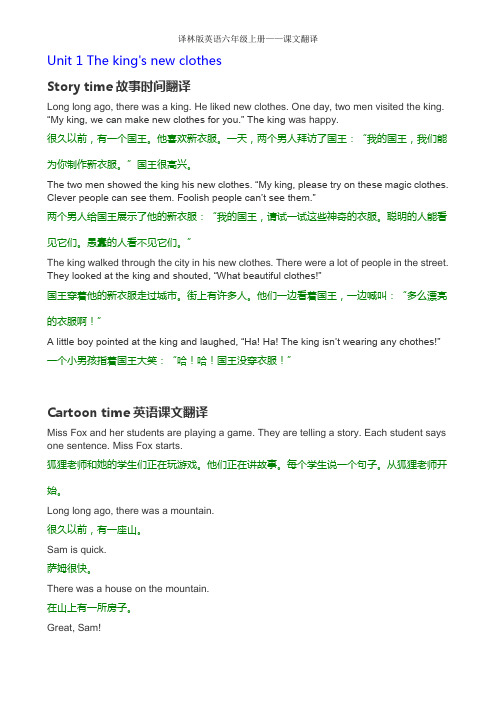
Unit 1 The king's new clothesStory time故事时间翻译Long long ago, there was a king. He liked new clothes. One day, two men visited the king. “My king, we can make new clothes for you.” The king was happy.很久以前,有一个国王。
他喜欢新衣服。
一天,两个男人拜访了国王:“我的国王,我们能为你制作新衣服。
”国王很高兴。
The two men showed the king his new clothes. “My king, please try on these magic clothes. Clever people can see them. Foolish people can’t see them.”两个男人给国王展示了他的新衣服:“我的国王,请试一试这些神奇的衣服。
聪明的人能看见它们。
愚蠢的人看不见它们。
”The king walked through the city in his new clothes. There were a lot of people in the street. They looked at the king and shouted, “What beautiful clothes!”国王穿着他的新衣服走过城市。
街上有许多人。
他们一边看着国王,一边喊叫:“多么漂亮的衣服啊!”A little boy pointed at the king and laughed, “Ha! Ha! The king isn’t wearing any chothes!”一个小男孩指着国王大笑:“哈!哈!国王没穿衣服!”Cartoon time英语课文翻译Miss Fox and her students are playing a game. They are telling a story. Each student says one sentence. Miss Fox starts.狐狸老师和她的学生们正在玩游戏。
牛津译林版小学英语六年级下册 全册 教案

牛津译林版小学英语六年级下册全册教案一、教学目标- 掌握六年级下册课本中的所有英语知识点和语法规则- 提高学生的听、说、读、写的能力- 培养学生的英语研究兴趣,培养良好的研究惯和团队合作精神二、教学内容和步骤Unit 1: Friendship1. Review and introduce new vocabulary related to friendship2. Practice reading and listening skills through dialogue and exercises3. Encourage students to discuss the importance of friendship and share their own experiences4. Extend the learning with writing activities, such as writing a letter to a friendUnit 2: Healthy Habits1. Introduce vocabulary related to health and healthy habits2. Teach grammar structures, such as the present simple tense and adverbs of frequency3. Engage students in role play and dialogue activities to practice using the language in context4. Foster discussions on the importance of maintaining a healthy lifestyleUnit 3: Our World1. Introduce vocabulary related to nature and the environment3. Engage students in reading and listening activities about environmental issues4. Encourage students to express their opinions on protecting the environment...三、教学方法和技巧1. 多媒体辅助教学:利用投影仪、音频和视频等多媒体设备进行教学,激发学生的研究兴趣和注意力。
2024年牛津译林版小学六年级上学期期中英语试题及答案指导

2024年牛津译林版英语小学六年级上学期期中模拟试题及答案指导一、听力部分(本大题有12小题,每小题2分,共24分)1、Listen to the following dialogue and choose the best answer to the question you hear.A. What is the weather like today?B. Where is the library?C. How is the school trip going?Answer: AExplanation: The question heard in the dialogue is, “What’s the weather like today?” indicating that the listener is asking about the current weather conditions.2、Listen to the following instructions and complete the sentence with the missing information.The teacher says, “Please put your books in your backpacks and make sure your laptops are charged. We are going to have a science experiment in the lab.”Complete the sentence: The teacher reminds the students to_______their books and laptops.Answer: packExplanation: The missing information in the sentence should be “pack” as the teacher is instructing the students to put their books in their backpacks, which is a form of packing.3、Listen to the conversation between two students in a school library and answer the following question.Question: What book is the boy looking for?A. A science bookB. A history bookC. A fiction bookAnswer: A. A science bookExplanation: In the conversation, the boy says, “I need a book that can help me understand the solar system.” This indicates that he is looking fora science book.4、Listen to the dialogue between a teacher and a student and complete the following sentence.Question: What is the student’s main concern about the assignment?A. The assignment is too difficult.B. The deadline is too close.C. The topic is not interesting.Answer: B. The deadline is too close.Explanation: The teacher asks the student, “How are you doing with your assignment?” The student replies, “I started it yesterday, but I don’t thinkI’ll finish it in time.” This shows that the student’s main concern is the deadline being too close.5、Listen to the following conversation and choose the best answer to complete the sentence.A. The teacher is asking the students about their weekend plans.B. The students are discussing their favorite subjects in school.C. The principal is giving a speech about the school’s achievements.Question: What is the main topic of the conversation?Answer: BExplanation: The conversation is about the students’ favorite subjects, indicating that it is a classroom discussion.6、Listen to the passage about a famous landmark and answer the following question.Question: What is the height of the Eiffel Tower?A. 200 metersB. 300 metersC. 400 metersAnswer: BExplanation: The Eiffel Tower is one of the most famous landmarks in the world and its height is 300 meters. This information is commonly known and often mentioned in discussions about the tower.7、Listen to the dialogue and choose the best answer to complete the sentence.A. The cat is sleeping on the sofa.B. The dog is barking loudly.C. The birds are chirping outside.Answer: BExplanation: The dialogue includes the sentence “Listen, the dog is barking loud ly outside,” which corresponds to option B.8、Listen to the short passage and answer the question.What is the main weather condition described in the passage?A. SunnyB. RainyC. WindyAnswer: BExplanation: The passage mentions “the heavy rain” and “the stormy weather,” indicating that the main weather condition described is rainy, which corresponds to option B.9、Listen to the dialogue and choose the correct answer. (录音材料: A student asks the librarian when the library closes. The librarian responds that it closes at 5 PM.)A. The library opens at 5 PM.B. The library closes at 5 PM.C. The library is closed on weekends.Correct Answer: B. The library closes at 5 PM.Explanation: In the dialogue, the librarian clearly states that the library closes at 5 PM, making option B the correct choice.10、Listen to the short passage about a day in the life of a zookeeper and select the activity that the zookeeper does last. (录音材料: A description of a zookeeper’s day starting with feeding the animals, cleaning the enclosures, giving an educational talk to visitors, and ending with preparing enrichment activities for the primates.)A. Feeding the animals.B. Cleaning the enclosures.C. Giving an educational talk to visitors.D. Preparing enrichment activities for the primates.Correct Answer: D. Preparing enrichment activities for the primates.Explanation: According to the passage, the zookeeper’s activities conclude with preparing enrichment activities for the primates, which makes option D the correct answer.11、You will hear a conversation about a school trip. What is the destination of the school trip mentioned in the conversation?A)The science museumB)The zooC)The botanical gardenAnswer: A) The science museumExplanation: In the conversation, one of the speakers clearly mentions that they are excited about the upcoming visit to the science museum as part of theirschool trip. The other locations, the zoo and the botanical garden, are not referred to in this particular dialogue.12、Listen to the description of someone’s daily routine. Which activity does the person do right after getting up in the morning?A)Having breakfastB)Taking a showerC)Doing some exerciseAnswer: C) Doing some exerciseExplanation: The listening passage describes the individual’s morning routine, starting with the action they perform immediately after waking up, which is doing some light stretching or exercise. This is followed by taking a shower and then having breakfast. Therefore, the correct sequence indicates that exercising comes first among the given options.二、选择题(本大题有12小题,每小题2分,共24分)1、Which of the following sentences is correctly punctuated?A. She likes reading, music, and traveling.B. She likes reading; music; and traveling.C. She likes reading, music, and traveling.D. She likes reading, music and traveling.Answer: CExplanation: The correct use of commas in a list of items is to separatethem, but not to use a comma before the conjunction “and” at the end of the list. Therefore, option C is correctly punctuated.2、Choose the correct word to complete the sentence.The cat_______in the garden.A. is layingB. laysC. laidD. layingAnswer: BExplanation: The sentence is in the present simple tense, which is used to describe habitual actions or general truths. Since the cat is doing the action of laying (laying eggs or in this context, laying down) as a habit, the correct verb form is “lays.”3、Which of the following sentences uses the correct form of the verb in parentheses?A)She (not go) to school yesterday because she was sick.B)They (finish) their homework before they went to play.C)We (study) English when the teacher came in.D)He (read) a book last night at ten o’clock.Answer: B) They finished their homework before they went to play.Explanation: The correct answer is B because it correctly uses the past simple tense ‘finished’ to indicate an action completed before another past action (‘went to play’). Option A should be “She didn’t go” or “She didnot go”; option C should be “were studying”; and option D should be “was reading” if it were meant to describe an ongoing action in the past.4、Choose the correct pronoun to replace the underlined words:The students and their teacher were very pleased with________performance at the school play.A)theirB)itsC)hisD)herAnswer: A) theirExplanation: The correct pronoun to use here is ‘their’, as it ref ers back to ‘the students and their teacher’. Since we’re talking about a group that includes more than one person (the students) and their teacher, a plural possessive pronoun is required. The other options do not match grammatically or contextually with the subject of the sentence.5.Choose the correct word to complete the sentence.The cat is very __________, and it always stays at home.A. activeB. lazyC. hungryD. happyAnswer: BExplanation: The correct answer is “lazy” because the sentence implies thatthe cat does not go out much and prefers staying at home. The other options, “active,” “hungry,” and “happy,” do not fit the context of the sentence.6.Select the sentence that is not a fact.A. The sun rises in the east and sets in the west.B. Elephants are the largest land animals.C. Cats have whiskers that help them navigate in the dark.D. The sky is blue because of the scattering of sunlight.Answer: DExplanation: The sentence “The sky is blue because of the scattering of sunlight” is a scientific explanation and can be considered a fact. The other sentences are well-known facts about the sun, elephants, and cats’ whiskers. Therefore, “D” is the sentence that is not a fact.7、Which of the following words has a different pronunciation from the others?A. seaB. meatC. breadD. teaAnswer: C. breadExplanation: In options A, B, and D, the ‘ea’ or ‘ee’ makes a long /iː/ sound. However, in option C, ‘ea’ makes a short /e/ sound, making it different from the rest.8、If you want to say that you usually go to the park on weekends, which sentence would be correct?A. I often go to the park on weekdays.B. I sometimes go to the park on Sundays.C. I usually go to the park on weekends.D. I always go to the park on Mondays.Answer: C. I usually go to the park on weekends.Explanation: The question asks for a statement that indicates a habitual action during the weekend. Option C uses the adverb “usually,” which suggests a regular pattern, and “on weekends” correctly refers to the time period mentioned in the question. The other options either refer to a different time (weekdays, Mondays) or do not match the frequency implied by “usually” (sometimes, always).9.Choose the correct word to complete the sentence:The cat likes to sit on the____________and watch the birds.A. windowB. doorC. floorD. wallAnswer: A. windowExplanation: The correct answer is “window” because cats often sit near windows to watch birds outside. The other options do not fit the context of thesentence.10.Read the sentence and choose the correct word to complete it:I was____________at school when I heard the news of my grandpa’s passing.A. playingB. sleepingC. eatingD. walkingAnswer: B. sleepingExplanation: The correct answer is “sleeping” because the sentence describes a situation where the speaker was at school and not able to be engaged in other activities like playing, eating, or walking at the time they heard the news. The other options do not fit the context of the sentence.11、What is the past tense of the verb “go”?A)goB)goesC)goingD)wentAnswer: D) wentExplanation:The correct past tense form of the verb “go” is “went.” When we talk about an action that happened in the past, we use the past tense. For example, “Yesterday, I went to the park.”12、Which word is a synonym (同义词) for “happy”?A)sadC)joyfulD)tiredAnswer: C) joyfulExplanation:A synonym is a word that has the same or nearly the same meaning as another word. “Joyful” means feeling or showing great happiness, which is a synon ym for “happy.” The other options express different emotions: “sad” means unhappy, “angry” means very annoyed, and “tired” means in need of sleep or rest.三、完型填空(10分)Oxford Treehouse Edition Grade 6 English Mid-Term Exam - Section 3: Cloze TestRead the following passage and choose the best word for each blank from the options given below.John was fascinated by the 1) of the ancient castle. He had always been 2) in history and wanted to explore more about the medieval times. One weekend, he decided to visit the castle 3) the forest. The path was 4) but worth the effort, as the castle was even more stunning than he had imagined. As he walked through the entrance, he noticed a sign that read, “Warning: Please do not touch the ancient artifacts.”John realized he should be 5) while exploring the castle.A)beautyC)hiddenD)shortE)careful1)A)beautyF)B)boredC)C)hiddenD)D)shortE)E)carefulAnswer: 1) A) beauty, 2) B) bored, 3) C) hidden, 4) D) short, 5) E) careful四、阅读理解(26分)Reading ComprehensionPassage:The following story is about a young girl named Lily, who has a passion for gardening. Lily lives in a small village in England. She has been gardening since she was a child and has learned many things from her grandmother, who is a professional gardener.One sunny morning, Lily decided to plant a new vegetable garden in her backyard. She spent the whole day preparing the soil, digging holes, and planting seeds. She carefully watered each seedling and covered them with a thin layer of soil. She also put up a small fence around the garden to protect it from animals.Days turned into weeks, and Lily watched her garden grow. She was thrilled to see the seeds sprout and the plants grow taller. She took great care of them, watering them regularly and pulling out any weeds that appeared.One day, as she was watering the garden, she noticed something strange. A small rabbit had made a hole near one of the plants and was eating the leaves. Lily was worried that the rabbit would destroy her garden. She decided to find a solution to protect her plants.After some thought, she came up with an idea. She gathered some branches and twigs from the woods and used them to create a makeshift barrier around the garden. She also set up some bird feeders in the nearby trees, hoping that the birds would help keep the rabbits away.Over the next few weeks, Lily continued to care for her garden. She watched as the vegetables grew and ripened. She was so proud of her hard work and was excited to finally be able to harvest her produce.Questions:1.What is the main topic of the passage?a) The importance of gardeningb) The life of a professional gardenerc) Lily’s passion for gardening and her vegetable gardend) The challenges of gardening2.How did Lily feel when she noticed the rabbit in her garden?a) Excitedb) Relievedc) Angryd) Worried3.What solution did Lily come up with to protect her garden from the rabbit?a) She used pesticidesb) She put up a fencec) She created a barrier with branches and twigsd) She stopped watering the plantsAnswers:1.c) Lily’s passion for gardening and her vegetable garden2.d) Worried3.c) She created a barrier with branches and twigs五、写作题(16分)Title: My Ideal SchoolWrite a short passage describing your ideal school. Include the following elements:1.The physical appearance of the school building and its surroundings.2.The type of education system and teaching methods used.3.The school facilities and resources available.4.The qualities of the students and teachers.5.Any special programs or extracurricular activities that you would like to see in your ideal school.Example:My ideal school is a beautiful, modern building located in a peaceful neighborhood. The school has a welcoming entrance with greenery and a pond, creating a serene environment for students and teachers. Inside, the classrooms are spacious and well-lit, equipped with the latest technology and resources.The education system in my ideal school is student-centered, emphasizing creativity and critical thinking. Teachers use a variety of teaching methods, including project-based learning and group discussions, to engage students in the learning process.The school facilities are exceptional, with well-maintained sports fields, a modern library, and a well-equipped laboratory. Additionally, there are art rooms, music rooms, and a drama club for students to explore their talents.Students in my ideal school are friendly, cooperative, and respectful. They value diversity and work together to create a positive and inclusive atmosphere. The teachers are dedicated, passionate, and supportive, always willing to help students achieve their full potential.In my ideal school, I would like to see a special program that promotesenvironmental awareness and sustainability. This could include activities such as recycling projects, tree planting, and community service initiatives. Furthermore, I would love to have a diverse range of extracurricular activities, such as debate club, coding workshops, and cultural exchange programs.Analysis:This example effectively covers all the required elements of the writing prompt. The passage begins by describing the physical appearance of the ideal school, emphasizing its serene and inviting surroundings. It then moves on to discuss the education system, highlighting the emphasis on student-centered learning and diverse teaching methods.The writer goes on to describe the school facilities, including the sports fields, library, laboratory, and extracurricular spaces. This showcases the comprehensive nature of the ideal school.The passage continues by describing the qualities of the students and teachers, emphasizing their cooperative nature, dedication, and supportiveness. This helps to create a positive and inclusive atmosphere within the school.Finally, the writer suggests a special program focused on environmental awareness and sustainability, as well as a diverse range of extracurricular activities. This demonstrates the writer’s vision for a well-rounded and engaging school experience.。
译林牛津版小学英语六年级上册全册课件

Look and say 回忆课文说一说
There are a lot of signs here, Ben.
Yes. They’re public signs. They mean different things.
1. There’s a sign on the wall. 2. There’s a sign on the grass. 3. The sign on the birds’ cage is interesting. Learning tip ③(学习方法小提示):
This is Jack. He is …
Read and answer
读书上前言,回答问题
Q1: Where is Jack now?
Q2: What does he see?
Q3: What is Jack doing now?
Learning tip ① (学习方法小提示):
当我们需要在短时间内通过阅读找出问题的答案 时,可以进行略读(即跳过其它,带着问题直接 找出有用信息)。
Try to say
B: Yes. They’re public signs. They mean different things. A: There’s a sign on the …. What does it mean?
a lot of questions. He sees some
public signs in the park. He is asking
Ben some questions about them.
Look and answer
看图,分别说说以下标志的含义
What does it mean?
What does it mean? It means “Danger”.
译林版小学英语六年级上册教案 全册
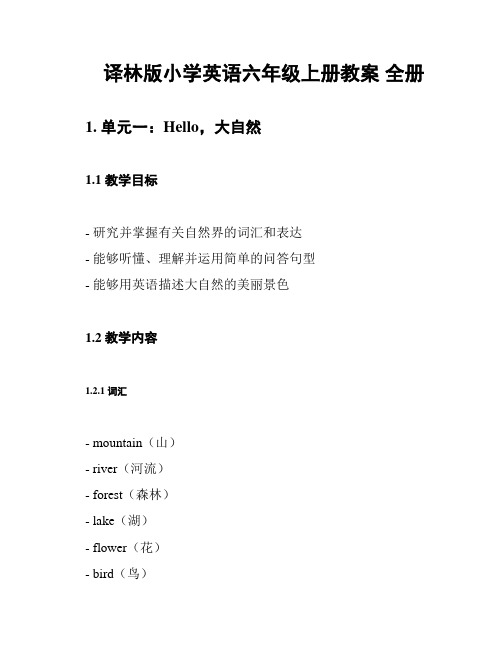
译林版小学英语六年级上册教案全册1. 单元一:Hello,大自然
1.1 教学目标
- 研究并掌握有关自然界的词汇和表达
- 能够听懂、理解并运用简单的问答句型
- 能够用英语描述大自然的美丽景色
1.2 教学内容
1.2.1 词汇
- mountain(山)
- river(河流)
- forest(森林)
- lake(湖)
- flower(花)
- bird(鸟)
1.2.2 句型
- What do you see? (你看到了什么?)
- I see... (我看到...)
1.3 教学步骤
1.3.1 导入新词汇
教师用图片和实物引导学生研究新的自然界词汇,并教授正确的发音。
1.3.2 听力训练
播放录音,让学生听录音内容,根据所听到的内容回答问题,通过问答练,加深学生对句型的理解。
1.3.3 口语表达练
学生分组进行对话练,描述他们所看到的自然景色,利用句型"What do you see?"和"I see..."进行交流。
1.3.4 拓展活动
让学生选择一幅自然景色图片,用所学词汇和句型进行描述,并展示给同学们。
1.4 教学评估
通过学生的口语表达和展示活动,评估学生是否能够正确运用所学词汇和句型进行描述。
译林版小学英语六年级上册全册知识点梳理

译林版小学英语六年级上册全册知识点梳理 LEKIBM standardization office【IBM5AB- LEKIBMK08- LEKIBM2C】Unit 1 The king’s new clothes一、四会单词:magic 有魔力的,神奇的 clothes 衣服 clever 聪明的 foolish 愚蠢的through 穿过※laugh 笑,大笑Shout 大叫 another 又一个each 每个 quick 迅速的,快的think 想,思考 hard 努力地,费劲地next 下一个※turn 机会 sentence 句子※wear 穿※tell 告诉※little小的※child孩子二、四会词组:long long ago 很久以前 try on 试穿point at 指着make new clothes for him 为他做新衣服 show sb. sth. = show sth. to sb. 向某人展示某物turn into 变成 make a sentence 造句in his new clothes 穿着他的新衣服tell sb. a story 给某物讲故事 live in 居住在 Be nice to ... 对...好 look after 照顾it is one’s turn 轮到某人了 have to 不得不 in front of 在...前面 walk by 路过think hard 努力地思考 shout at sb. 对某人大喊三.重点句型:1.Long long ago, there was a king. 很久很久以前,有一个国王。
2.Two men visited the king. 两个男人来拜访国王。
3.We can make new clothes for you. 我们可以为你做新衣服。
4.The two men showed the king his new clothes. 这两个人向国王展示了他的新衣服。
新译林版英语六年级上册Unit1-4动词现在完成时
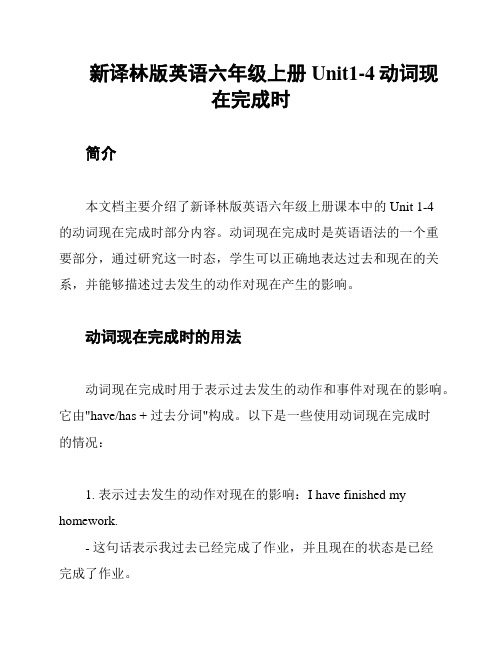
新译林版英语六年级上册Unit1-4动词现在完成时简介本文档主要介绍了新译林版英语六年级上册课本中的Unit 1-4的动词现在完成时部分内容。
动词现在完成时是英语语法的一个重要部分,通过研究这一时态,学生可以正确地表达过去和现在的关系,并能够描述过去发生的动作对现在产生的影响。
动词现在完成时的用法动词现在完成时用于表示过去发生的动作和事件对现在的影响。
它由"have/has + 过去分词"构成。
以下是一些使用动词现在完成时的情况:1. 表示过去发生的动作对现在的影响:I have finished my homework.- 这句话表示我过去已经完成了作业,并且现在的状态是已经完成了作业。
2. 表示过去发生的动作在现在仍然持续或存在:He has lived in this city for ten years.- 这句话表示他过去开始住在这座城市,到现在已经住了十年了,现在仍然在住在这座城市。
3. 表示过去发生的动作与现在有关联:She has lost her keys, so she can't enter the house.- 这句话表示她过去丢失了钥匙,所以现在无法进入房子。
动词现在完成时的注意事项研究动词现在完成时时,需要注意以下几点:1. 主语为第三人称单数时使用"has",其他情况下使用"have"。
2. 某些动词的过去分词与其基本形式相同,如"cut"、"put"等,需要特别注意。
Unit 1-4中的动词现在完成时相关内容在新译林版英语六年级上册Unit 1-4中,我们研究了许多与动词现在完成时相关的话题和活动。
以下是一些例子:1. Unit 1: My School Life- 学生可以通过描述自己在学校的生活来运用动词现在完成时,比如"I have learned many new things in my school life."2. Unit 2: My Family3. Unit 3: My Hobbies4. Unit 4: My Home- 学生可以介绍自己家的情况,并使用动词现在完成时来描述过去到现在的变化,比如"Our family has renovated the house."以上仅是一些例子,学生在研究这些单元时,可以结合动词现在完成时的用法来进行描述和交流。
译林版小学英语单词表6年级上册

译林版小学英语单词表6年级上册Unit1long long ago很久以前magic有魔力的,神奇的clever聪明的foolish愚蠢的through穿过laugh笑,大笑wear穿tell讲,叙述each每个say说sentence句子quick迅速的,快的next下一个little小的,年幼的turn机会think想,思考hard努力地,费劲地child孩子turn into变成Unit2sunny晴朗的show展览,展示interesting有趣的,有意思的weather天气become变成,变为windy有风的cloudy多云的high在高处sky天空bring带来honey蜂蜜drink饮料ant蚂蚁bee蜜蜂cloud云rain下雨rainy多雨的lose丢失know知道what happened出什么事了climb up爬上hold onto抓紧fly away飞走Unit3holiday假日,假期National Day国庆节call打电话bund(上海)外滩Shanghai Museum上海博物馆star星星Great Wall长城Palace Museum故宫Summer Palace颐和园Tian’anmen Square天安门广场fashion show时装表演,时装秀excited激动的,兴奋的paper纸ask问bottle瓶子go well进展顺利at first开始,最初heavy rain大雨Unit4then and now过去和现在ago…以前use使用,利用telephone电话office办公室mobile phone移动电话any where随处,到处radio收音机newspaper报纸news新闻watch观察e-book电子书make friends交朋友all over the world全世界do shopping购物TV电视look out of朝……外看go on继续still仍然What day is today今天是星期几spell拼读,拼写make a sentence造句with用yesterday昨天Unit5sign标识shopping center购物中心careful小心,当心What does it mean这是什么意思mean意思是floor地面litter乱扔垃圾go in进入take…into带入restaurant饭店,餐厅someone某人smoke抽烟smell闻到No eating or drinking.请勿饮食。
译林版小学英语六年级上册 Unit1-8 知识点梳理

Unit 1 The King’s new clothes 一、词汇1.有魔力的magic2.聪明的clever3.想think4.愚蠢的foolish5.穿过through6.笑,大笑laugh7.穿wear8.讲,叙述tell9.每个each10.说say11.句子sentence12.迅速的,快的quick13.下一个next14.小的little15.机会turn16.努力地,费劲地hard17.孩子child (复数children)二、短语1.皇帝的新衣the king’s new clothes2.某一天one day3.拜访国王visit the king4.两个男子/女子two men/women5.穿过城市walk through the city6.试穿try on7.这些魔法these magic clothes8.为你做新衣服make new clothes for you9.在街上in the street10.给国王看他的新衣show the king his new clothes11.聪明的人clever people12.愚蠢的人foolish people13.看着国王look at the king14.穿着他的新衣in his new clothes / wear his new clothes15.一个小男孩a little boy16.指着国王point at/to the king17.非常合身fit well18.今天下午this afternoon19.一张来自我好友Mark的卡a card from my good friend Mark20.来参加我的聚会come to my party21.在四点半at half past four22.在公园里in the park23.一个美国牛仔an American cowboy 24.穿着牛仔裤wear jeans25.一个苏格兰男士a Scottish man26.穿一条苏格兰裙wear a kilt27.讲故事tell a story28.狐狸老师和她的学生们Miss Fox and her students29.在山上on the mountain30.下一句the next sentence31.给男孩讲了一个故事tell the boy a story32.努力地想think hard33.不得不重新开始讲故事have to start the story again34.住在森林里live in the forest35.生病了be sick/be ill36.在狮子的房子前面in front of the lion’s house37.在房子旁边散步walk by the house38.照顾他look after him39.愤怒的狮子the angry lion40.对着老人大喊shout at the old man41.把你的孩子给我give me your child =give your child to me42.背诵课文recite the text43.和狮子住在一起live with the lion44.对她很好be nice to her45.变成一个王子turn into a prince三、句子1.很久以前,有个国王。
译林版小学六年级英语下册--课文翻译
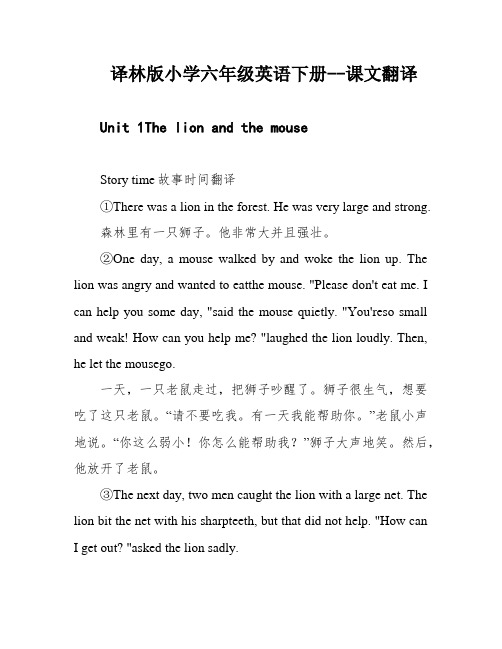
译林版小学六年级英语下册--课文翻译Unit 1The lion and the mouseStory time故事时间翻译①There was a lion in the forest. He was very large and strong.森林里有一只狮子。
他非常大并且强壮。
②One day, a mouse walked by and woke the lion up. The lion was angry and wanted to eatthe mouse. "Please don't eat me. I can help you some day, "said the mouse quietly. "You'reso small and weak! How can you help me? "laughed the lion loudly. Then, he let the mousego.一天,一只老鼠走过,把狮子吵醒了。
狮子很生气,想要吃了这只老鼠。
“请不要吃我。
有一天我能帮助你。
”老鼠小声地说。
“你这么弱小!你怎么能帮助我?”狮子大声地笑。
然后,他放开了老鼠。
③The next day, two men caught the lion with a large net. The lion bit the net with his sharpteeth, but that did not help. "How can I get out? "asked the lion sadly.第二天,两个男人用一张大网抓住了狮子。
狮子用他锋利的牙齿咬那张网,但那不管用。
“我怎么能出去呢?”狮子难过地问。
④Just then, the mouse saw the lion. "I can help you, " he said. Soon, the mouse made abig hole in the net with his teeth.The lion got out. "Thank you!" said the lion happily.就在那时,老鼠看见了狮子。
译林版小学六年级英语上册教案
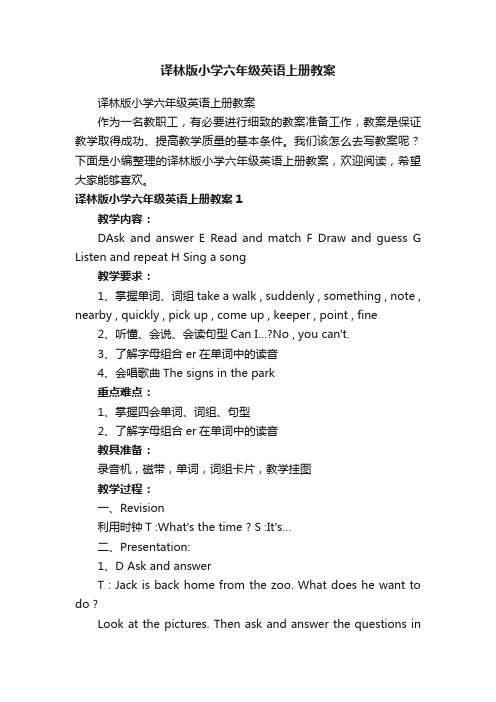
译林版小学六年级英语上册教案译林版小学六年级英语上册教案作为一名教职工,有必要进行细致的教案准备工作,教案是保证教学取得成功、提高教学质量的基本条件。
我们该怎么去写教案呢?下面是小编整理的译林版小学六年级英语上册教案,欢迎阅读,希望大家能够喜欢。
译林版小学六年级英语上册教案1教学内容:DAsk and answer E Read and match F Draw and guess G Listen and repeat H Sing a song教学要求:1、掌握单词、词组take a walk , suddenly , something , note , nearby , quickly , pick up , come up , keeper , point , fine2、听懂、会说、会读句型Can I…?No , you can't.3、了解字母组合er在单词中的读音4、会唱歌曲The signs in the park重点难点:1、掌握四会单词、词组、句型2、了解字母组合er在单词中的读音教具准备:录音机,磁带,单词,词组卡片,教学挂图教学过程:一、Revision利用时钟T :What's the time ? S :It's…二、Presentation:1、D Ask and answerT : Jack is back home from the zoo. What does he want to do ?Look at the pictures. Then ask and answer the questions inpairs.Picture 1 A :Can I go to the park ?B :No , you can't . You should go home now .Picture 2 A : Can I have an ice-cream ?B :No, you can't . You should have dinner now.Picture 3 A :Can I watch TV ?B :No ,you can't . You should read your books now .Picture 4 A :Can I play computer games ?B :No , you can't . you should go to bed now . Then say together2、Read and matchT :Ben is reading a story . Look at the pictures and help Ben write the correct letters in the boxes .Listen to the tape , answer the questions .[1] What is Mr Smith doing in the park ?[2] what does he see on the grass ?[3]And what does he do ?[4]Who comes up to Mr Smith and what does he say ?[5]How much does the park keeper fine Mr Smith ?边回答,边教授单词、词组take a walk , suddenly , something , not , nearby , quickly , pick up , come up , keeper , point , fine 集体朗读单词集体读短文,个别表演课文三、Read and match部分单词、词组较多,要多创设情景,便于学生掌握,尤其是词组:pick it up使用需强调,以及区分ten-yuan note与ten yuan 3四、Draw and guessToday is Sunday .Ben Nancy and Jack are playing a game about public signs.让学生看懂P20游戏要求,请学生自己画公共标志T :what does this sign mean ?Yes , you're right . Sorry , you're worry . Try again .五、Listen and repeat1、跟读单词2、How to pronounced “er”here ?3、Any other words “er”pronounced//4、Read the sentence5、比较er发音为// 5六、Sing a song1、Read the song2、Explain some words or phrases3、Listen to the tape and sing together .七、Practice:《练习册》A Listen and choose八、Homework1、Copy the new words2、Recite Part E,G板书设计:Unit 2 Public signsJack :Can I…? Mum :No , you can't .You should…now ./ / brother peter sister tigerPeter's brother and sister like the toy tiger译林版小学六年级英语上册教案2一、教学目标知识目标1、能听懂.会说.会读和会拼: blackboard bookcase music computer sometimes near songbook2、能听懂.会说.会读: our classroom watch TV lots of3、能听懂.会说.会读和会写句型: There is/are ...in/on/near...能力目标1、能用There be句型介绍某一场所。
译林版小学六年级英语词汇大全
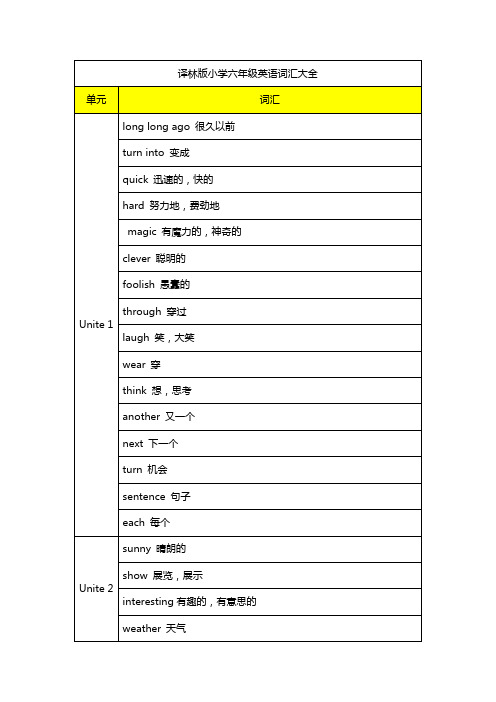
clever聪明的
climbup 爬上
cloud 云
cloudy 多云的 coal 煤炭
come from 从……来,来自
cut down 砍伐,砍掉
cinema 电影院
D
Danger!危险!
doshopping 购物
drive开车驾驶
dead 死的
dirty肮脏的
drink 饮料
lion dance 舞狮
fireworks 烟花表演
firecracker 鞭炮
rich 富有的,有钱的
plan 计划,打算
hooray 好极了
Ⅱ
A
ago……以前 air 空气
all over the world 全世界
another 又一个
ant 蚂蚁
anywhere 随处,到处
around在……周围
Hong Kong香港
hooray 好极了
heavy rain 大雨
holiday 假日,假期
G
Great Wall 长城
go well 进展顺利
go on 继续
go in 进入,走进
glass 玻璃
gate 大门
mobile phone 移动电话,手机
make friends 交朋友
all over the world 全世界
look out of 朝……外看
go on 继续
spell 拼读,拼写
make a sentence 造句
yesterday昨天
ago ……以前
telephone 电话
office 办公室
No smoking. 请勿吸烟
六年级上册英语第五单元单词译林版

六年级上册英语第五单元单词译林版一、单词。
1. sign [saɪn] 名词,标识;标志。
2. shopping centre [ˈʃɒpɪŋˈsentə(r)] 名词短语,购物中心。
3. careful [ˈkeəfl] 形容词,小心的,仔细的。
4. mean [miːn] 动词,意思是。
5. floor [flɔː(r)] 名词,地面;楼层。
6. litter [ˈlɪtə(r)] 名词,垃圾;不可数名词,乱丢杂物(动词)7. go in [ɡəʊɪn] 动词短语,进入;走进。
8. take... into... [teɪk... ˈɪntuː...] 动词短语,把……带进……9. restaurant [ˈrestrɒnt] 名词,餐馆;饭店。
10. someone [ˈsʌmwʌn] 代词,某人。
11. smoke [sməʊk] 名词,烟;烟雾;动词,吸烟;抽烟。
12. smell [smel] 名词,气味;动词,闻起来;嗅。
13. No eating or drinking. [nəʊˈiːtɪŋɔː(r) ˈdrɪŋkɪŋ] 短语,请勿饮食。
14. No littering. [nəʊˈlɪtərɪŋ] 短语,请勿乱扔垃圾。
15. No parking. [nəʊˈpɑːkɪŋ] 短语,请勿停车。
16. Danger! [ˈdeɪndʒə(r)] 名词,危险;危险物;感叹词,危险!17. Wet floor. [wet flɔː(r)] 短语,小心地滑。
18. Outing [ˈaʊtɪŋ] 名词,外出游玩;远足。
19. walk on [wɔːk ɒn] 动词短语,继续走路;向前走。
20. around [əˈraʊnd] 介词,在……周围;环绕着。
六年级上册英语-Unit 8 Chinese New Year 单元知识点-译林版
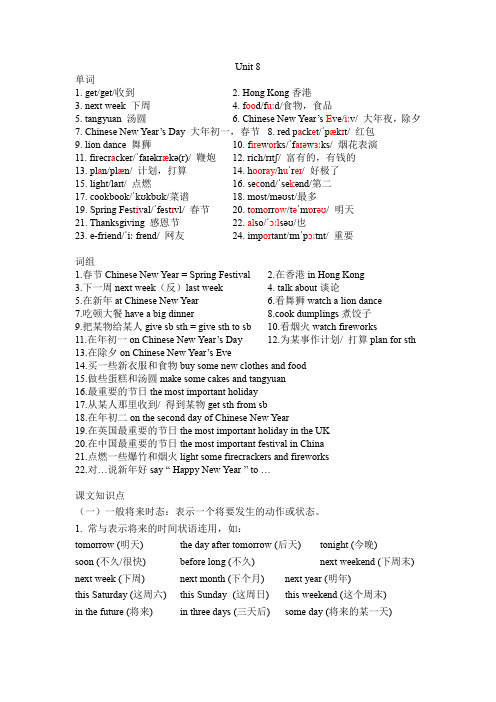
Unit 8单词1. get/get/收到2. Hong Kong香港3. next week 下周4. f oo d/f uːd/食物,食品5. tangyuan 汤圆6. Chinese New Year’s E ve/iːv/ 大年夜,除夕7. Chinese New Year’s Day 大年初一,春节8. red p a ck e t/ˈpækɪt/ 红包9. lion dance 舞狮10. f ire w or ks/ˈf aɪəwɜːks/ 烟花表演11. firecr a cker/ˈfaɪəkrækə(r)/ 鞭炮12. rich/rɪtʃ/ 富有的,有钱的13. pl a n/plæn/ 计划,打算14. h oo r ay/h uˈr eɪ/ 好极了15. light/laɪt/ 点燃16. se c ond/ˈse kənd/第二17. cookbook/ˈkʊkbʊk/菜谱18. most/məʊst/最多19. Spring Fest i val/ˈfestɪvl/ 春节20. t o m o rr ow/təˈmɒrəʊ/ 明天21. Thanksgiving 感恩节22. al so/ˈɔːl səʊ/也23. e-friend/ˈiː frend/ 网友24. imp or tant/ɪmˈpɔːtnt/ 重要词组1.春节Chinese New Year = Spring Festival2.在香港in Hong Kong3.下一周next week(反)last week4. talk about谈论5.在新年at Chinese New Year6.看舞狮watch a lion dance7.吃顿大餐have a big dinner 8.cook dumplings煮饺子9.把某物给某人give sb sth = give sth to sb 10.看烟火watch fireworks11.在年初一on Chinese New Year’s Day12.为某事作计划/ 打算plan for sth13.在除夕on Chinese New Year’s Eve14.买一些新衣服和食物buy some new clothes and food15.做些蛋糕和汤圆make some cakes and tangyuan16.最重要的节日the most important holiday17.从某人那里收到/ 得到某物get sth from sb18.在年初二on the second day of Chinese New Year19.在英国最重要的节日the most important holiday in the UK20.在中国最重要的节日the most important festival in China21.点燃一些爆竹和烟火light some firecrackers and fireworks22.对…说新年好say “ Happy New Year ” to …课文知识点(一)一般将来时态:表示一个将要发生的动作或状态。
译林版英语小学六年级上册--课文翻译(课文翻译)

Unit 1 The king's new clothesStory time故事时间翻译Long long ago, there was a king. He liked new clothes. One day, two men visited the king. “My king, we can make new clothes for you.” The king was happy.很久以前,有一个国王。
他喜欢新衣服。
一天,两个男人拜访了国王:“我的国王,我们能为你制作新衣服。
”国王很高兴。
The two men showed the king his new clothes. “My king, please try on these magic clothes. Clever people can see them. Foolish people can’t see them.”两个男人给国王展示了他的新衣服:“我的国王,请试一试这些神奇的衣服。
聪明的人能看见它们。
愚蠢的人看不见它们。
”The king walked through the city in his new clothes. There were a lot of people in the street. They looked at the king and shouted, “What beautiful clothes!”国王穿着他的新衣服走过城市。
街上有许多人。
他们一边看着国王,一边喊叫:“多么漂亮的衣服啊!”A little boy pointed at the king and laughed, “Ha! Ha! The king isn’t wearing any chothes!”一个小男孩指着国王大笑:“哈!哈!国王没穿衣服!”Cartoon time英语课文翻译Miss Fox and her students are playing a game. They are telling a story. Each student says one sentence. Miss Fox starts.狐狸老师和她的学生们正在玩游戏。
- 1、下载文档前请自行甄别文档内容的完整性,平台不提供额外的编辑、内容补充、找答案等附加服务。
- 2、"仅部分预览"的文档,不可在线预览部分如存在完整性等问题,可反馈申请退款(可完整预览的文档不适用该条件!)。
- 3、如文档侵犯您的权益,请联系客服反馈,我们会尽快为您处理(人工客服工作时间:9:00-18:30)。
译林版小学六年级英语 6A Unit1
一.词汇
1.mean [动词] 表……的意思,含……之意;为……的征兆;图谋;计划;决
定
[第三人称单数]means
[现在分词] meaning
[过去式] meant
[过去分词] meant
[形容词] 粗陋的,破烂不堪的;卑鄙的;中间的;平庸的
[比较级]meaner
[最高级]meanest
[名词]中间,居中;中庸
[复数]means
in a mean street 在鄙陋的街道上
the happy mean 中庸之道
meab sth.sb 对某人重要
例句:
①They mean different things.它们有不同的含义。
②It was mean of you to eat all the cakes.你把蛋糕全吃光了,你可太坏
了。
2.danger [名词]危险
[复数]dangers
in danger of 有……危险
danger money 危险工作津贴
out of danger 脱离危险
例句:
①It means “Danger”.它意味着“危险”。
②His life was in danger. 他的生命有危险。
③He is out danger now.他现在已脱离危险了。
每个指提供部分供大家参考,如有需要请联系,………………
3.public [形容词]公众的;为公众的;与公众有关的
public signs 公共标志
public house 酒馆
public ownership 国家所以(制);公有(制)
public spirt 热心公益
public transport 公共交通工具
例句:
①I know a lot about public signs.我知道很多公共标志。
②We can read in a public library. 我们可以在公共图书馆看书。
每个指提供部分供大家参考,如有需要请联系,………………
4.question [名词]疑问句;问题;询问,质问;需要决定之事物;查询;怀疑;
反对
[复数]questions
[动词]询问;审问;对……表示或感到怀疑
[第三人称单数]questions
[现在分词]questioning
[过去式]questioned
[过去分词]questioned
some questions 一些问题
out of the question 不可能的,根本不必讨论的
question mark 问号
beyond(all)/without question 毫无疑问
call sth. in question 对……表示怀疑
例句:
① She has many questions. 她有许多问题
② Where’s the man in question?我们谈论的那个人在哪里?
③ He was questioned by the police. 他被警方询问。
每个指提供部分供大家参考,如有需要请联系,………………
二.句子翻译
1. Today is Saturday . 今天是星期六。
2. Ben and his cousin,Jake,are in the park. 本和他的堂弟杰克在公园里。
3. Jack is only four years old but he always has a lot of questions. 杰
克只有四岁,但他总有许多问题
4. He can see some public signs in the park . 他在公园里能看见一些公共
标示。
每个指提供部分供大家参考,如有需要请联系,………………
15. It means “keep off the grass”. 它的意思是“请勿践踏草坪”。
16. What does that mean? 那个是什么意思?
17. It means we shouldn’t walk on the grass.它的意思是我们不能在草地
上走。
18. The sign on the bird’s cage is interesting. 鸟笼上的标示很有趣。
19. What does it mean? 它是什么意思?
每个指提供部分供大家参考,如有需要请联系,………………
22. Ben and Jack are at home now. 本和杰克现在在家里。
23. They are talking about the park. 他们正在谈论公园里的事。
24. No smoking. 禁止吸烟。
25. No littering . 禁止乱扔垃圾。
26. No parking . 禁止停车。
每个指提供部分供大家参考,如有需要请联系,………………
36. Mr Smith looks around. There’s no one nearby. 史密斯先生环视四周。
可周围没有一个人。
37. He quickly walks to the note and picks it up. 他迅速走到纸币前捡起
纸币。
38. Then a park keeper comes up to him. 一会儿一位公园管理员向他走了过
来。
39. The park keeper points to a sign on the grass. 公园管理员指着草坪
上的一块指示牌。
40. He says to Mr Smith, ‘Can’t you see the sign over there,sir? It says,”
PLEASE KEEP OFF THE GRASS.FINE 10 YUAN”.Now,you should give me ten yuan.’他对史密斯先生说:“先生,难道你没看见那边的那块牌子吗?上面写着‘请勿践踏草坪,违者罚款十元。
’现在,你得付十元罚款。
”
41. What does this sign mean? 这个标示是什么意思?
每个指提供部分供大家参考,如有需要请联系,………………
48. We should not walk on the grass. 我们不能在草坪上走。
49. Please put your rubbish in the bin. 请把垃圾放到垃圾箱里。
三.句式讲解。
1. What does this sign mean? 标志是什么意思?
It means “Keep off the grass”. 它的意思是“请勿践踏草坪”。
It means we shouldn’t walk on the grass.它的意思是我们不能在草地上走。
在这组对话中,问句中的主语是 this sign,是单数,动词 mean 要构成问句就得借用助动词does 来完成句子。
在答句中,由于主语也是单数,动词就得用第三人称的单数形式,即用 means.
第一个答句是解释标识牌的含义,第二个答句则是说明根据标示牌的含义,我们应该干什么,不应该干什么。
例句
What does this sign mean ? 这个标示是什么意思?
It means “Keep quiet”. 它的意思是“保持安静”。
It means we shouldn’t make noise here. 它的意思是我们不能在这儿吵闹。
2. Can I ……?我们能……?
No ,you can’t .You should ……now. 不,你不能。
现在你应该做……。
在这组对话中,问句是询问能否做某件事,以征求允许或许可。
而答句则是对问句的请求作出判断与应答,并提出进一步的要求,即现在你不应该做某事,而应该做某事。
例句:
Can I play computer games? 我能玩电脑游戏吗?
No, you can’t. You should go to bed now. 不,不行。
你现在该上床了。
四.练一练
一.看图示。
认标示,写单词
略
二.翻译词组
1. 只有四岁_________________________
2. 一些公共标示________________________
3. 一些关于……的问题________________________
4. 远离________________________。
